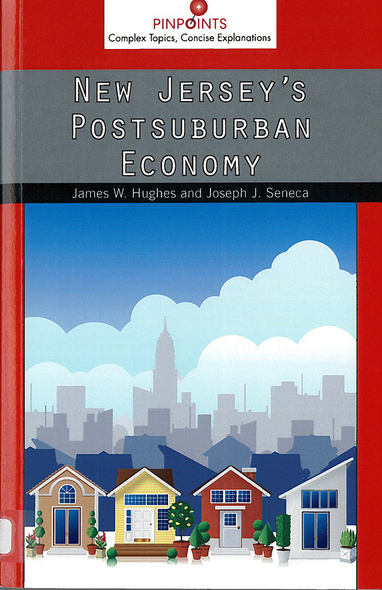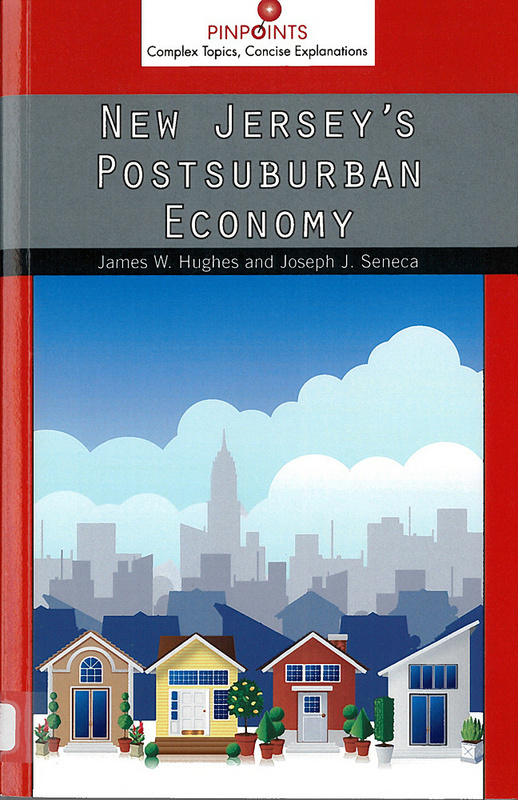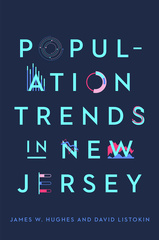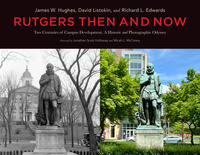
152 pages, 6 x 9
1 map, 3 figures, 22 tables
Paperback
Release Date:10 Oct 2014
ISBN:9780813570013
New Jersey's Postsuburban Economy
By James W. Hughes and Joseph Seneca
SERIES:
Pinpoints
Rutgers University Press
New Jersey has a long history of adapting to a changing economic climate. From its colonial origins to the present day, New Jersey's economy has continuously and successfully confronted the challenges and uncertainties of technological and demographic change, placing the state at the forefront of each national and global economic era. Based on James W. Hughes and Joseph J. Seneca’s nearly three-decade-long Rutgers Regional Report series, New Jersey’s Postsuburban Economy presents the issues confronting the state and brings to the forefront ideas for meeting these challenges.
From the rural agricultural and natural resource based economy and lifestyle of the seventeenth century to today’s postindustrial, suburban-dominated, automobile-dependent economy, the economic drivers which were considered to be an asset are now viewed by many to be the state’s greatest disadvantage. On the brink of yet another transformation, this one driven by a new technology and an internet based global economy, New Jersey will have to adapt itself yet again—this time to a postsuburban digital economy.
Hughes and Seneca describe the forces that are now propelling the state into yet another economic era. They do this in the context of historical economic transformations of New Jersey, setting out the technological, demographic, and transportation shifts that defined and drove them.
From the rural agricultural and natural resource based economy and lifestyle of the seventeenth century to today’s postindustrial, suburban-dominated, automobile-dependent economy, the economic drivers which were considered to be an asset are now viewed by many to be the state’s greatest disadvantage. On the brink of yet another transformation, this one driven by a new technology and an internet based global economy, New Jersey will have to adapt itself yet again—this time to a postsuburban digital economy.
Hughes and Seneca describe the forces that are now propelling the state into yet another economic era. They do this in the context of historical economic transformations of New Jersey, setting out the technological, demographic, and transportation shifts that defined and drove them.
If you are interested in New Jersey's economy, its history, its recent and present condition, and knowledgeable projections as to where it's going, Jim Hughes and Joe Seneca should be your go-to guys. Their clear and easy-to-read writing style makes economics almost enjoyable.
Featured in the January 2016 issue [http://njmonthly.com/articles/jersey-living/booming-burbs/]
A view of New Jersey’s past, present and future economy by two of the states most respected scholars. Should be a must read for anybody hoping to shape future economic policy.
Featured in the January 2016 issue [http://njmonthly.com/articles/jersey-living/booming-burbs/]
A view of New Jersey’s past, present and future economy by two of the states most respected scholars. Should be a must read for anybody hoping to shape future economic policy.
If you are interested in New Jersey's economy, its history, its recent and present condition, and knowledgeable projections as to where it's going, Jim Hughes and Joe Seneca should be your go-to guys. Their clear and easy-to-read writing style makes economics almost enjoyable.
JAMES W. HUGHES is Distinguished Professor and dean, Edward J. Bloustein School of Planning and Public Policy at Rutgers University, and director of the Rutgers Regional Report.
JOSEPH J. SENECA, formerly chief academic officer at Rutgers University and chair of the New Jersey Council of Economic Advisors, is Distinguished University Professor of economics at Rutgers. He is coauthor of America’s Demographic Tapestry (Rutgers University Press) with James W. Hughes.
TABLE OF CONTENTS
List of Figures
List of Tables
Preface
1—Introduction and Overview
2—The Structure of the New Jersey Economy and the Business Cycle
3—The Broad Historical Evolution
4—Transportation and the Economy
5—The Wealth Belt
6—Demography, the Economy, and Housing
7—New Millennium, New Dynamics
Notes
List of Figures
List of Tables
Preface
1—Introduction and Overview
2—The Structure of the New Jersey Economy and the Business Cycle
3—The Broad Historical Evolution
4—Transportation and the Economy
5—The Wealth Belt
6—Demography, the Economy, and Housing
7—New Millennium, New Dynamics
Notes






